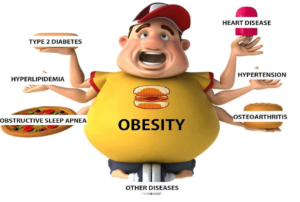Dr Vishaj S Maru
Obesity is not because it runs in the family!! It happens because no one runs in the family!!
The term obesity describes a person who is overweight, with a lot of body weight. And being overweight is linked to a number of health and oral health diseases including high blood pressure, diabetes, cancer, heart disease, gallbladder and gallstones, breathing problems such as sleep apnea (when a person stops breathing for a short time during sleep) and asthma, oral health problems such as caries, halitosis, poor oral hygiene and periodontal diseases. Little wonder then that the World Health Organisation declared obesity as a global epidemic back in 1990.

The symptoms for obesity include breathlessness, increased sweating, snoring, inability to cope with sudden physical activity, feeling tired, back and joint pain, low confidence and self-esteem, feeling isolated. For most of us, health is not valued till sickness arrives, isn’t it?
But if you are aware of the risks, proper health and oral hygiene should be maintained. A poor diet may result in a lack of essential nutrients and vitamins thus potentially making it more difficult for your body to fight off an infection. Diets high in fats and calories including large quantities of processed foods or sugar can cause oral health problems including gum diseases, premature tooth loss and bad breath.
Our body craves for what is in our bloodstream. Wheat, sugar, alcohol, coffee and devitalised foods are designed to be addictive. Sugar being addictive, agreed. But how does sugar affect an individual’s health and oral health? Well, consuming too much sugar has become a norm and can cause health issues. The only type of sugar the body needs is glucose which it can make by breaking down carbohydrates, proteins and fats. When ingested, simple sugars are converted into plaque if not removed immediately. As plaque begins to accumulate on our teeth and gums, the risk of varying forms of gum disease such a gingivitis and periodontitis as well as tooth decay, may become inevitable.
On one hand, oral health is strongly influenced by the daily intake of food and on the other, it can play a significant role in nutritional intake and general health status. The dental caries is a chronic disease and may depend on oral hygiene, high intake of sugar added to food, lifestyle factors and a host of others factors like salivary flow, buffer capacity and buccal microflora.
The relationship between obesity and gum disease is not clear though in case of diabetes and the relationship is bilateral. Periodontal disease will affect diabetes and diabetes will worsen periodontal disease.
Due to improper maintenance of oral hygiene, chronic periodontal infection may occur. It is an inflammatory state that is described by a deviation in microbial environment and composition of subgingival plaque biofilms and accelerated destruction of tooth supporting structures. Thus, low glycaemic diet may be beneficial to our oral health.
Periodontal diseases are also influenced by various risk factors including ageing, smoking, oral hygiene, socio-economic status, psychosocial stress, osteopenia, osteoporosis and various systemic diseases. On examination obese adolescents exhibited multiple carious teeth, higher plaque index, gingival inflammation, bleeding on probing and probing depth compared to normal weight subjects of similar age.
Dentists should include the evaluation of BMI in routine patient examination and eventually refer obese periodontal adolescents for weight reduction interventions like diet therapy, behavioural therapy, pharmacotherapy, so that they can have better control over periodontal inflammation.
It can be difficult carrying out dental care for an obese patient. The position of anatomical landmarks may be less obvious if surrounded by fatty tissue, the landmarks for placement of an inferior alveolar nerve block can be impossible to palpate through excess soft tissue. It may be impossible to palpate cervical lymph nodes in a large neck.
Also due to constant secretion of saliva, the mouth and teeth are rinsed and kept free off food debris and foreign particles, thus excess of buccal pad of fat hinders with self-cleansing action in the mouth. Because of lack of saliva present in the mouth, it can lead to dry mouth. Sip water frequently throughout the day and use alcohol-free antiseptic mouthwash daily for cure.
New researches suggest the health of your mouth mirrors the condition of your body as a whole. A healthy smile can surely transform our visual appearance and the positivity of our mindset.
‘Eat every two hours, sleep eight hours, have plenty of water and pray to keep calm. Most importantly, carry a smile on your face.’
Dr Maru is a Mumbai-based dental surgeon